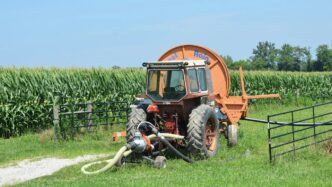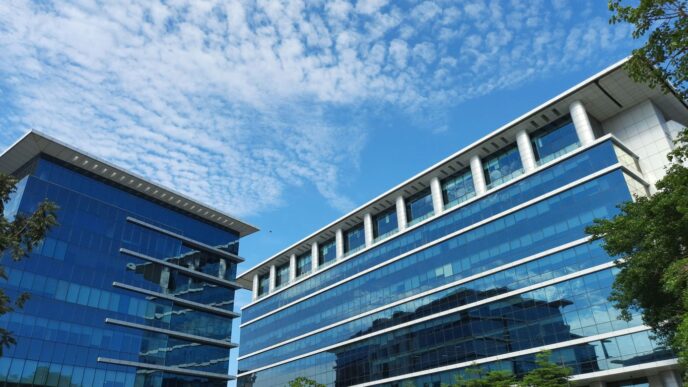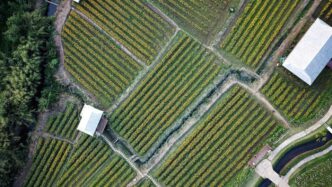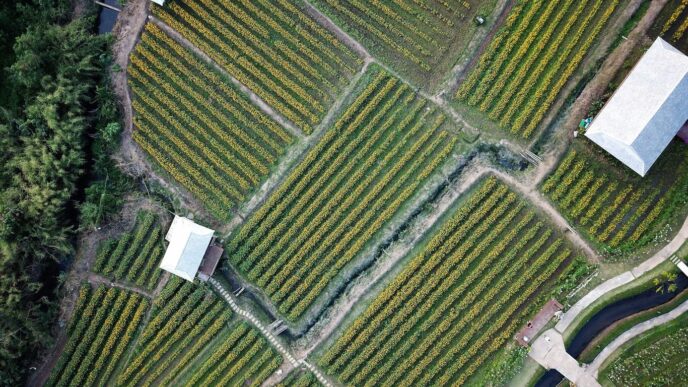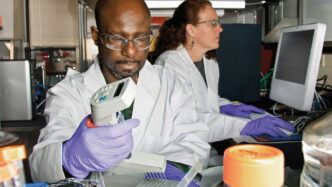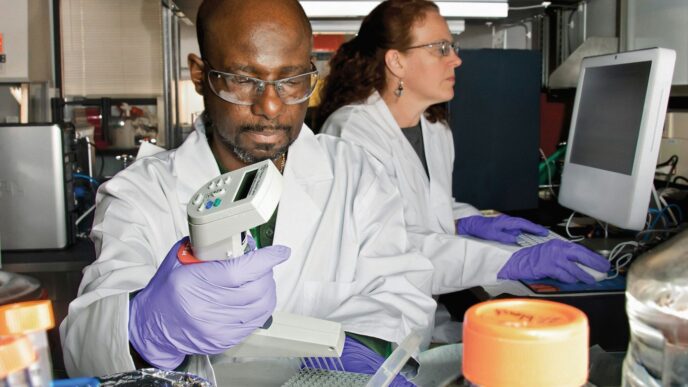Farming is changing, and Bayer Crop Sciences is right there, coming up with new ways to help farmers grow more food. It’s not just about seeds anymore; it’s about using smart tech and new science to deal with tough weather, pesky bugs, and diseases. This article looks at some of the cool stuff Bayer is doing to make farming better for everyone, from the farmer in the field to the food on our plates.
Key Takeaways
- Bayer Crop Sciences is using digital tools to help farmers make smarter decisions with real-time data about their fields.
- New disease-tolerant corn and advanced pest protection, like BT traits, are helping farmers fight off threats to their crops.
- Innovations like shorter corn varieties and better root systems are being developed to help crops handle dry weather caused by climate change.
- The future of farming relies on strong genetics, new biotech, and smart ways to protect crops to grow more food with fewer resources.
- Bayer is also focused on improving crop protection through seed treatments, biological products, and soil health programs to support farmers.
Advancing Agriculture Through Bayer Crop Sciences Innovations
Farming is changing, and Bayer Crop Science is right there with new ideas to help. It’s not just about planting seeds anymore; it’s about using smart tools and knowing what’s happening with your crops in real-time. This helps farmers make better choices, using what they have more wisely and getting more out of their fields.
Harnessing Digital Tools for Data-Driven Decisions
Think of it like having a super-smart assistant for your farm. Digital tools collect all sorts of information – like the weather forecast, if there are any bugs around, what the soil is like, and how the plants are growing. This data helps farmers know exactly what to do, and when. It means less guesswork and more confidence in the decisions made.
Optimizing Resources with Real-Time Crop Insights
Knowing what’s going on with your crops as it happens is a game-changer. Instead of waiting to see a problem, farmers can get alerts and see trends. This means they can adjust watering, fertilizing, or pest control right away. It’s all about using resources like water and fertilizer only where and when they are needed most, which is good for the farm’s bottom line and the environment.
Mitigating Risks with Proactive Management Strategies
Farming always has risks, like unexpected weather or new pests showing up. Bayer’s approach helps farmers get ahead of these problems. For example, they’ve developed corn varieties that can handle diseases like Goss’s wilt better. They also have new technologies to fight off pests like the fall armyworm. Being prepared and having solutions ready means less chance of losing a whole crop.
Combating Crop Threats with Bayer’s Solutions
Even with the best seeds and digital tools, farmers are always up against things that want to eat their crops or make them sick. It’s a constant battle out there. Bayer is working on ways to help growers fight back.
Developing Disease-Tolerant Maize Hybrids
Diseases can wipe out a whole field if you’re not careful. Take Goss’s wilt, for example. It’s a bacterial disease that can really hurt corn yields. Bayer has put a lot of effort into finding and breeding corn varieties that can handle this disease better. This means farmers can worry a little less about Goss’s wilt ruining their harvest.
Implementing Advanced Pest Protection Technologies
Pests are another big headache. Things like the fall armyworm and the maize stalk borer can do a lot of damage, especially to corn. Bayer is using technology, like BT traits, to give crops better defenses. They’re even developing new things, like LEP4 technology, which adds more proteins to help fight off pests like the fall armyworm. The goal is to make these defenses last longer and work better.
Ensuring Crop Durability and Efficacy
It’s not just about having a solution; it’s about making sure it works well and keeps working. This means developing seeds that are tough and treatments that are effective. It’s about making sure that when a farmer plants Bayer seeds, they have a good chance of a successful harvest, even when facing tough conditions and pests. This involves a few key areas:
- Seed Treatments: These are applied right to the seed before planting. They act like a first line of defense, protecting the young plant from early-season pests and diseases.
- Biological Products: These use natural organisms to help protect crops. They’re a more sustainable way to manage threats without relying solely on traditional chemicals.
- Fertility Programs: Healthy plants are stronger plants. Making sure crops have the right nutrients helps them withstand stress from diseases and pests better.
Innovations Addressing Climate Change Challenges

Climate change is really shaking things up for farmers, and Bayer is working on some pretty smart solutions to help. It’s not just about hotter summers or weirder rain patterns anymore; it’s about making sure crops can handle it.
Biotech Solutions for Drought Resilience
One big issue is water scarcity. We’re seeing new biotech approaches that help maize plants deal with dry spells better. These aren’t just minor tweaks; they’re designed to make plants tougher when the going gets dry. Think about plants that can pull more water from deeper in the soil. This means less worry about losing a whole season’s crop when the rain doesn’t show up.
Developing Shorter-Stature Maize Varieties
This might sound a bit odd, but Bayer is looking at developing maize varieties that are shorter. Why? Well, these shorter plants are being engineered to have root systems that spread out more and go deeper. This improved root structure helps them find and use water that’s available in the soil more effectively. It’s a clever way to make the most of what water is there, especially in areas prone to drought.
Enhancing Water Access with Improved Root Systems
So, the whole idea behind the shorter-stature maize and other developments is really about the roots. A better root system means the plant is more stable and can access nutrients and water more efficiently. This is a game-changer for areas where water is unpredictable. It’s about building crops that are more self-sufficient and less dependent on perfect weather conditions. We need crops that can survive and produce even when the climate throws curveballs.
The Future of Farming Fueled by Bayer
Genetic Traits Driving Yield Potential
Bayer is really pushing the boundaries with new genetic traits. Think about it, we’ve got a growing world population, and we need to feed more people using less land and fewer resources. That’s where these advanced genetics come in. They’re designed to help crops grow better, resist problems, and ultimately produce more food. It’s not just about making plants bigger; it’s about making them smarter and tougher.
Biotechnology for Enhanced Crop Performance
Biotechnology is a big part of this. We’re seeing developments like shorter-stature maize varieties. These aren’t just a cool new look; they’re built to handle tough conditions. For instance, they’re being developed with root systems that can reach deeper into the soil for water. This is a game-changer, especially when droughts hit. It means more reliable harvests even when the weather isn’t cooperating.
Integrated Approaches for Sustainable Production
It’s not just about the seeds themselves, though. Bayer is looking at the whole picture. This includes things like seed treatments that give young plants a head start against pests and diseases. They’re also working on biological products, which are more natural ways to keep crops healthy. And let’s not forget about fertility programs – making sure the soil has what the plants need. Combining these different tools gives farmers a much better chance to grow crops successfully and sustainably. It’s about making sure we can keep producing food for years to come without wearing out the land.
Revolutionizing Crop Production with Advanced Breeding
Gene Editing for Crop Resilience
We’re seeing some pretty big shifts in how we develop new crop varieties. Gene editing, for instance, is a game-changer. It lets us make very specific changes to a plant’s DNA, almost like fine-tuning an instrument. This means we can develop crops that are naturally tougher, better able to handle things like drought or diseases without needing as many chemical interventions. Think about crops that can shrug off a tough dry spell or resist a common blight. It’s about making plants more robust from the ground up.
Precision Breeding for Superior Genetics
Beyond gene editing, there’s also precision breeding. This is about using advanced tools and a lot of data to select the best parent plants for crossing. We’re not just guessing anymore; we’re using detailed genetic information to predict which combinations will give us the best results. This speeds up the process of developing new seeds with traits that farmers really need, like higher yields or better nutrient content. It’s a more targeted approach to getting the best possible genetics into the seeds we plant.
Ensuring High Yields and Sustainable Futures
Ultimately, all this advanced breeding work is aimed at one thing: helping farmers grow more food, more reliably, and in a way that’s good for the planet. By creating crops that are more resilient and productive, we can help farmers face challenges like changing weather patterns and growing populations. It’s about building a stronger foundation for agriculture, one that can keep up with demand while also being mindful of our natural resources. This means farmers can get more from their land, season after season, contributing to a more secure food supply for everyone.
A Robust Ecosystem for Crop Protection
It’s not just about the seeds themselves; keeping those crops healthy and productive means having a solid system in place to guard them. Think of it like building a strong defense for your plants.
Seed Treatments for Enhanced Defense
Starting seeds off right is a big deal. Seed treatments are like a first line of defense, giving young plants a better chance from day one. These treatments can help protect against early-season pests and diseases that might otherwise stunt growth or cause serious damage. It’s a way to give crops a head start and build their resilience before they even face the big challenges out in the field.
Biological Products for Sustainable Farming
Beyond traditional methods, there’s a growing focus on biological solutions. These products often come from natural sources, like beneficial microbes or plant extracts. They can help improve soil health, boost plant growth, and even help plants fend off certain problems. Using these can be a more gentle approach to farming, working with nature rather than against it, which is pretty important for long-term sustainability.
Fertility Programs for Optimal Crop Health
Finally, making sure crops have the right nutrients is key. This isn’t just about throwing fertilizer around; it’s about having a smart fertility program. This means understanding what your soil needs and what your specific crop requires at different stages of its growth. Getting the balance right helps plants grow strong, develop well, and be better equipped to handle stress, whether that’s from weather or other threats. A well-fed plant is a more robust plant.
Bayer Crop Sciences: A Legacy of Innovation

Bayer’s work in agriculture isn’t just about what’s new; it’s built on a long history of making farming better. Think about cotton, for instance. It’s been a staple crop for ages, and Bayer has been there, helping growers improve their yields and quality for a long time. It’s a story that goes way back, even before modern technology, showing a real commitment to the land and the people who work it.
Cotton’s Enduring Innovation
Cotton farming in America has a deep history, stretching back to inventions like the cotton gin. Bayer has played a part in this ongoing story, supporting farmers with tools and knowledge. It’s about more than just growing a crop; it’s about being part of an industry that has shaped communities and economies for generations. This section looks at what it means to be a cotton grower today and how Bayer’s continued focus helps keep this important crop relevant.
ThryvOn® Technology for Modern Growers
One of the newer developments making waves is ThryvOn® Technology. This isn’t just another product; it’s designed to give crops a better defense from the start. It works by helping seeds produce their own protective proteins, which can really cut down on the need for certain insecticides later on. This means less work for the farmer and a healthier start for the plant. It’s a smart way to handle common pests, making farming more efficient and potentially more profitable.
Preparing the Next Generation of Farmers
Looking ahead, Bayer is also focused on the future by supporting the next wave of farmers. This involves sharing knowledge, introducing new technologies, and helping young people get into agriculture. The goal is to make sure that farming continues to thrive, adapting to new challenges and opportunities. It’s about passing on the legacy while building a stronger, more sustainable agricultural system for everyone.
- Supporting education and training programs.
- Introducing innovative tools that are easier for new farmers to use.
- Encouraging sustainable practices for long-term success.
Looking Ahead
So, what does all this mean for the future of farming? It’s clear that Bayer Crop Science is really pushing forward with new ideas. From using digital tools to keep a closer eye on crops and make smarter choices, to developing seeds that can fight off tough diseases and pests, they’re trying to help farmers grow more food, even when things get tricky. Plus, with climate change making things unpredictable, they’re working on new types of crops, like shorter corn that can handle dry spells better. It’s all about making sure we can keep feeding everyone, now and in the years to come, by making farming more efficient and sustainable. It seems like a lot of exciting changes are on the way for farmers.
Frequently Asked Questions
How does Bayer help farmers make smarter decisions?
Bayer uses digital tools that act like a farmer’s smart assistant. These tools look at information about the weather, bugs, soil, and how the plants are growing. This helps farmers know exactly what their fields need, so they can use water and fertilizer wisely and protect their crops better. It’s all about using data to get the best results.
What does Bayer do to protect crops from diseases and pests?
Bayer works on creating special seeds that can fight off diseases, like a natural shield. They also develop advanced technologies, like special proteins in the seeds, that make it harder for bugs like the fall armyworm to damage the plants. This means less crop loss and healthier plants.
How is Bayer helping farmers deal with climate change, like droughts?
Climate change can make farming tricky, especially with less rain. Bayer is creating new types of corn that are tougher and can grow deeper roots to find water. They are also working on corn that grows a bit shorter, which can help it survive better when water is scarce. This helps make sure we can still grow food even when the weather is tough.
What makes Bayer’s seeds so good for growing more food?
Bayer uses cutting-edge science, like gene editing and precise breeding, to create seeds with amazing qualities. These seeds are designed to grow bigger, resist problems better, and produce more food from the same amount of land. It’s like giving the plants a super boost right from the start.
Besides seeds, what else does Bayer offer to keep crops healthy?
Bayer provides a whole system to protect crops. This includes special coatings for seeds that give them early protection, natural products that are good for the environment, and special feeding programs to make sure plants have all the nutrients they need. It’s a complete package to keep crops strong and healthy all season long.
What is ThryvOn® Technology?
ThryvOn® Technology is a special innovation from Bayer, particularly for cotton farmers. It’s designed to help their crops perform better and be more resilient. Think of it as an upgrade that helps the cotton plants thrive, making farming more successful for growers today and preparing them for the future.

